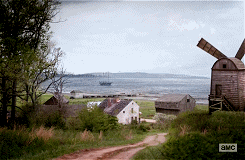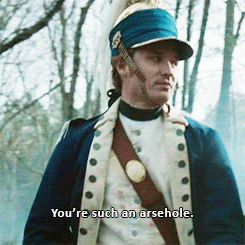linguistics
Accents and Anachronisms: What did people sound like in 18th century America?
Today we’re tackling a popular subject: What’s going on with all the different accents in TURN? It’s one of our most-requested topics! The questions we’ve received range from skeptical commentary to pure curiosity (which tends to be the case with every topic, not just this one). We’ve chosen one example from each category below. The greater takeaway is that among TURN viewers, there’s clearly a lot of interest in what people in the 18th century sounded like when they spoke. There’s a wealth of scholarship on 18th century linguistics out there, but for purposes of answering these TURN-related questions, we’ll try to tackle one small slice at a time — with plenty of links for further reading!
Question 1: “Yeah,” “Okay,” and Other Aggravating Anachronisms
Q1: “I am curious about the recent devolution of the King’s English this season. “Yeah”? “Great!”? Seems disappointingly anachronistic.”
Well, yeah! Great question. (wink) Although as we can see from the pictures below, anachronistic speech has been present throughout TURN’s entire run.
(Once again, Caleb Brewster takes first place as the most egregious violator of 18th century standards: a quick script search shows that “Yeah” is one of his favorite replies to just about anything.)
While the words and responses above are good examples of modern words that are inappropriate for 18th century speech, just how “disappointing” they are is a good subject for healthy debate. Most modern viewers don’t even notice anachronistic words, inflections, and turns of phrase like “yeah” and “that’s great” because they’re so deeply ingrained into our everyday conversations. If you find your ears perking up at the sound of modern words in a historical setting, your historical spider-sense is finely tuned, indeed! (Readers: Are you bothered when you hear modern words and phrases in historical TV shows? Do you even notice them at all? Let us know in the comments!)
Your question brings up a very interesting larger point, however: Should a period TV show or movie aspire to linguistic purity as one of its goals? Of course, like everything else in historical fiction, it’s more than just a simple yes or no question; there’s a huge range of historically-informed possibilities to consider. Modern audiences would likely be lost if TURN used nothing but meticulously reconstructed 18th century American accents and vocabulary. However, words like “yeah,” “okay,” and even “hello” are pretty obvious anachronisms (well, obvious to anyone who’s studied the 18th century in depth) that could easily be swapped out for other period-correct alternatives.
The writers of TURN have touted the show’s very sporadic use of 18th century slang (like “chunder bucket” in Episode 8 of Season 1) – but while those occasional trivia tidbits are certainly fun, viewers shouldn’t be fooled into believing that the dialogue in TURN is a faithful representation of how people conversed in 18th century America.
Interested in more word histories? Want to try hunting down linguistic anachronisms yourself? Try searching online dictionaries like the extremely thorough Oxford English Dictionary or free sites like dictionary.com to look up the etymology (historical origins) of common words. Most etymologies specify a date range when the word in question was first observed in common use. Then, if you’re really ambitious, you can even search online transcripts of TURN (or any other historical show) to see if and when they pop up in the script!

In order to try and piece together accurate vocabulary lists and speech patterns of the past, historians have to cross-reference as many letters, journals, diaries, schoolbooks, and other documents as they can find. It’s no easy task! (Yet another good reason for Hollywood to hire — and actually listen to — reputable historians as behind-the-scenes consultants.) If you’re feeling ambitious, you can browse through Samuel Johnson’s famous 1755 dictionary for a better idea of how English speakers used certain words. For those who might be intimidated by total immersion in 18th century sources, Colonial Williamsburg has a fun, light, and very readable guide with greetings and phrases appropriate to the Revolutionary era.
Question 2: Anomalous Accents
Q2: “What kind of accent would people [in colonial America] have in the 1770s?”
In lieu of using 18th century language, it seems like the strategy on TURN has been to give the main characters distinct accents in order to subtly remind viewers that the show takes place in the 18th century. Apparently this strategy has been very successful, if the volume of accent-related questions we’ve received about accents is any indication! While all of the colorful shades of English, Irish, and Scottish accents featured in TURN are pleasing to the modern ear, how appropriate are they for the historical characters and places depicted in the show?

In most cases, not very. For example: in TURN, Robert Rogers’ Scottish brogue is so thick you could cut it with a knife. The real Robert Rogers, in marked contrast, was born in Massachusetts and raised in New Hampshire – two colonies with overwhelmingly English populations in the 18th century. And the original ‘Major’ Hewlett (meaning Richard Hewlett, of course, not the “wait, never mind, we decided to call him Edmund, he’s a completely different person now!” Hewlett revealed to viewers during last week’s episode) was a Long Island-born American loyalist who certainly wouldn’t have spoken with an impeccably crisp high British accent. Indeed, many of the most heavily-accented characters in TURN were, in reality, American-born men and women whose families had been anchored in the American colonies for generations. Their families weren’t “fresh off the boat” from England, Scotland, or anywhere else. The Woodhull family alone had been anchored in Long Island for over a hundred years before the Revolution began!
All right, then: So what did American colonists from New England and New York sound like in the 18th century?
First of all, there’s no one right answer to that question. It depends on a number of factors, like the heritage, location, and education level of any given person. In some bustling colonial port cities, an 18th century traveler could find himself surrounded by several strange and exotic-sounding accents all in the course of a single day, as one itinerant doctor observed while traveling through New York in 1744. It would be just as hard to argue for one single representative “Colonial American” accent as it would be to argue for one single representative “Modern American” accent today. (Try getting a Texan and a New Yorker to agree on that!)
Of course, that doesn’t mean that we don’t have SOME idea of what colonists sounded like in the 18th century! Colonial Americans, especially in the New England and Mid-Atlantic colonies, had a remarkably high rate of literacy, even among women – but few received anything more than a rudimentary education from home or a local tutor or grammar school. These modestly-educated people, for the most part, tended to spell words phonetically – i.e. how they heard them spoken. So, perhaps ironically, the documents left behind by these less-educated colonists are often more helpful in determining the sound of local speech than those written by educated elites!
of what colonists sounded like in the 18th century! Colonial Americans, especially in the New England and Mid-Atlantic colonies, had a remarkably high rate of literacy, even among women – but few received anything more than a rudimentary education from home or a local tutor or grammar school. These modestly-educated people, for the most part, tended to spell words phonetically – i.e. how they heard them spoken. So, perhaps ironically, the documents left behind by these less-educated colonists are often more helpful in determining the sound of local speech than those written by educated elites!
Take Paul Revere for example. In his (excellent and very readable) book Paul Revere’s Ride, David Hackett Fischer helps us imagine what it might have been like to converse with the famous (and modestly educated) Boston patriot:
“His spelling tells us that Paul Revere talked with a harsh, nasal New England twang. His strong Yankee accent derived from a family of East Anglian dialects that came to Boston in the 17th century, and can still be faintly heard today.
When Paul Revere’s friends wrote in defense of their cherished charter rights, they spelled “charter” as chattaer… and probably pronounced it with no r at all. All his life Paul Revere spelled “get” as git. His mother’s maiden name of Hitchborn was written Hitchbon in the town of Boston, which was pronounced Bast’n. His friends wrote mash for “marsh” and want for “weren’t,” hull for “whole” and foller for “follow,” sarve for “serve” and acummin for “coming.” …This was the folk-speech of an Anglo-American culture that was already six generations old by 1775, and deeply rooted in Paul Revere’s New England.”
Notice that Fischer states that this proto-Boston accent had been in place long before the start of the Revolution! (Fischer expands on this concept in his book Albion’s Seed.) Indeed, British soldiers and European travelers had been noting since the mid-18th century how odd the speech of American colonists sounded compared to the King’s English.
 Thankfully for historians, Revere and many of his peers weren’t “over-educated” to the point where they stopped spelling words like they heard them. But while that fact makes modern historians happy, it was a thorn in the side of Early American pedants and schoolmasters who saw it as their mission to popularize “proper” spelling and punctuation. As a result, we can find some pretty amusing “corrective” lists well into the early 19th century! We’ve included one such list below for you to browse through and/or download and enjoy. Published in 1808, Caleb Brigham’s “The Child’s Companion” spelling book contained the following appendix of “Improprieties in Pronunciation common among the people of New-England.” While this dates from after the Revolution, you can spot several overlaps between Brigham’s list and Fischer’s description of Revolutionary Boston speech above. I’ll bet some of you New Englanders can find some overlap with modern Boston accents, too!
Thankfully for historians, Revere and many of his peers weren’t “over-educated” to the point where they stopped spelling words like they heard them. But while that fact makes modern historians happy, it was a thorn in the side of Early American pedants and schoolmasters who saw it as their mission to popularize “proper” spelling and punctuation. As a result, we can find some pretty amusing “corrective” lists well into the early 19th century! We’ve included one such list below for you to browse through and/or download and enjoy. Published in 1808, Caleb Brigham’s “The Child’s Companion” spelling book contained the following appendix of “Improprieties in Pronunciation common among the people of New-England.” While this dates from after the Revolution, you can spot several overlaps between Brigham’s list and Fischer’s description of Revolutionary Boston speech above. I’ll bet some of you New Englanders can find some overlap with modern Boston accents, too!
So, while there’s no single correct answer to “What did people in Early America sound like?”, we can get a fun glimpse of what common New England speech might have sounded like in the late 18th to early 19th century thanks to primary sources like the one below. This is just one of many books, diaries, and journals out there that give us a colorful glimpse into the sounds and speech of Early America. If you have any favorite sources, share them with us on Facebook, Twitter, or in the comments below! Enjoy your browsing, and keep those questions coming!
-RS
Caleb Bingham’s “Improprieties in Pronunciation common among the people of New-England”
Click on the thumbnails to view and/or download the full sized pages. If you’re not used to reading Early American print, keep in mind that many of the “f” characters are actually a lowercase “s.” Google Books has a full copy of Mr. Bingham’s spelling book online, if you’d like to save or view it as a PDF form.







